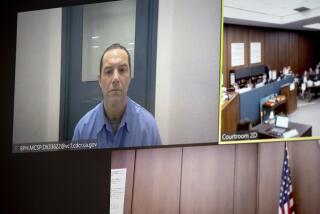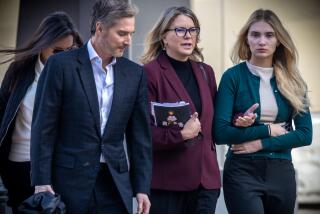Jury shut out of some of the drama at Spector murder trial
- Share via
The most dramatic exchanges in the Phil Spector murder trial Thursday occurred away from the jury, as defense lawyers pushed to allow jurors to hear statements Spector made to police after his arrest, as well as what was written on Lana Clarkson’s computer suggesting she was despondent shortly before her death.
Spector told police in the hours after Clarkson was found shot in his home the morning of Feb. 3, 2003, that she had shot herself while singing “Da Doo Ron Ron” and other Spector-produced songs. That statement and others he made insisting that the 40-year-old actress killed herself have thus far not been allowed in his trial.
During a break in the otherwise clinical cross-examination of Deputy Medical Examiner Louis Pena, Spector’s attorneys asked Judge Larry Paul Fidler to allow the statements in court. Pena said he ruled Clarkson’s death a homicide partly because Spector allegedly told his driver “I think I killed somebody.”
Spector attorneys Christopher J. Plourd and Bruce Cutler said it was important to ask Pena if he had considered Spector’s remarks to police that Clarkson shot herself.
Fidler did not bite. Spector could have concocted those statements to cover himself, Fidler said, and if they were to be repeated, prosecutors would have to be allowed to cross-examine him. “His statements are out, and if he wants those statements in, he may testify,” Fidler said.
It is doubtful whether attorneys for Spector, 67, will allow him to take the stand.
Spector’s attorneys also asked to present writings from Clarkson’s home computer in which she described heavy drug and alcohol use and hearing voices. “They indicate in a nutshell she was depressed,” Plourd said. “In the most significant ones, she talks about delusions, hearing things, seeing things.”
Pena had testified that he did not believe Clarkson was depressed, that she was hopeful and thus he did not think she was suicidal. Deputy Dist. Atty. Alan Jackson said Clarkson’s writings may have been fictional, and thus should not be allowed as evidence. He noted she was taking a creative writing class and the computer files could have been a fictional project.
Rather than bar the material, Fidler asked Jackson if the question of whether it was fiction was “more appropriate for cross-examination or argument?”
After jurors were dismissed in the afternoon, Fidler said he had read some of the writings and was leaning toward allowing them in court.
He also heard from Spector attorney Roger Rosen that a defense witness may have been bullied by a district attorney investigator last week, and that a prosecutor subpoenaed New York University for the academic transcripts of forensic scientist Henry Lee, the key defense witness.
Rosen said probing Lee’s school record was meant to signal that “the court is not a friendly place,” and asked Fidler to address both incidents. The incident with the investigator, if true, he said, could amount to witness intimidation.
Deputy Dist. Atty. Patrick Dixon said requesting academic records is routine and that an audiotape had been made of the D.A. investigator’s visit to the defense witness. Fidler said the tape could be played next week and he would decide what to do about both that and the university inquiry.
More to Read
The biggest entertainment stories
Get our big stories about Hollywood, film, television, music, arts, culture and more right in your inbox as soon as they publish.
You may occasionally receive promotional content from the Los Angeles Times.









